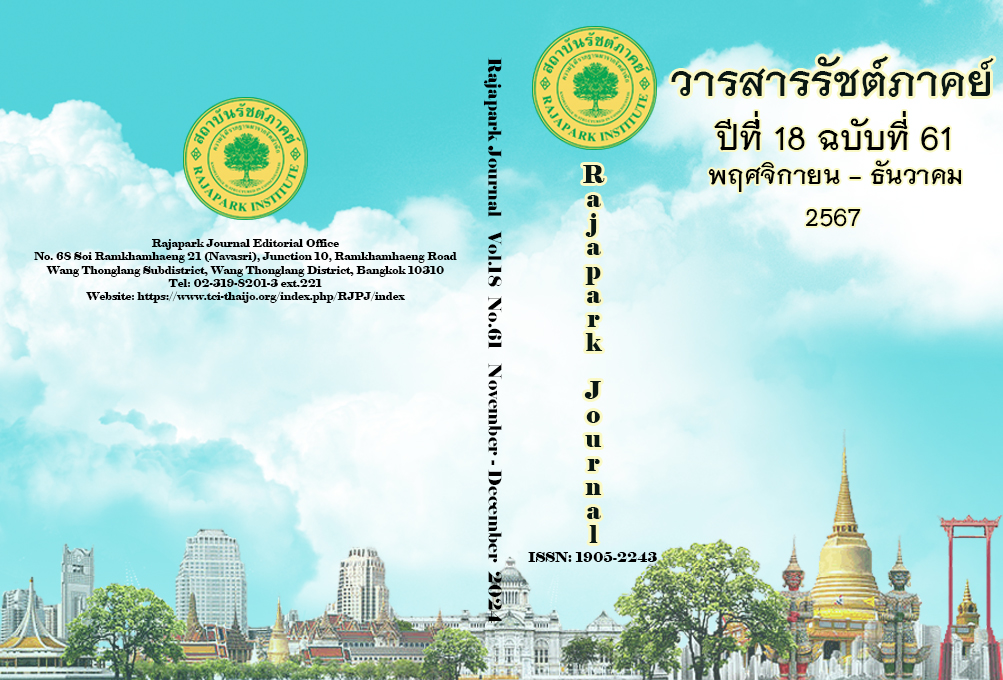The Development of Local History Curriculum in Fang River Basin to Enhance Active Citizenship for Upper Secondary School Student
Main Article Content
Abstract
This research aimed to 1) develop and evaluate the quality of a local history curriculum in the Fang River Basin. 2) Implement the local history curriculum in the Fang River Basin. The study employed a research and development methodology, conducted in two phases. Phase 1 involved curriculum development and quality assessment. The key informants consisted of 7 community leaders and local scholars, 3 school administrators, 5 teachers, and 5 curriculum specialists, totaling 20 participants, selected through purposive sampling. The research instrument was a curriculum suitability assessment form. Data was analyzed using mean and standard deviation. In phase 2, the curriculum implementation involved 40 students from Mathayomsuksa 4/9, selected through purposive sampling. A one-group posttest design was used. Research instruments included an essay test and an active citizenship assessment scale for student self-evaluation. Data was analyzed using mean and standard deviation. The research findings were as follows: 1) The curriculum document comprised seven components: curriculum principles, objectives, course description, course structure, learning activities, assessment and evaluation, and learning media and resources. The overall suitability of the curriculum document, as evaluated by community leaders, local experts, and curriculum specialists, had mean scores of 4.24 (SD = 0.45) and 4.28 (SD = 0.39), respectively. 2) Students demonstrated a high level of knowledge and understanding of Fang River Basin local history (overall mean = 3.87, SD = 0.68) and a high level of active citizenship (overall mean = 4.23, SD = 0.61).
Article Details

This work is licensed under a Creative Commons Attribution-NonCommercial-NoDerivatives 4.0 International License.
Views and opinions appearing in the Journal it is the responsibility of the author of the article, and does not constitute the view and responsibility of the editorial team.
References
Apple, M. W. (2019). Ideology and curriculum (4th ed.). Routledge.
Auamcharoen, S. (2018). Curriculum development: concepts and practices. Odeon Store.
Banks, J. A. (2008). Diversity, group identity, and citizenship education in a global age. Educational Researcher, 37(3), 129-139. http://dx.doi.org/10.3102/0013189X08317501
Barton, K. C., & Levstik, L. S. (2004). Teaching history for the common good. Lawrence Erlbaum Associates.
Barton, K. C., & Levstik, L. S. (2016). Why don't more history teachers engage students in interpretation?. In W. C. Parker (Ed.), Social studies today: Research and practice (2nd ed.). Routledge.
Bennett, W. L., Wells, C., & Rank, A. (2009). Young citizens and civic learning: Two paradigms of citizenship in the digital age. Citizenship Studies, 13(2), 105-120. DOI:10.1080/13621020902731116
Chomchuen, Y. (2018). The development of history learning model throught historical method and blended learning for mathayomsuksa 2 students. Burapha University.
Chuwan, Y. (2008). Local history: study methods and roles in Thai society. Thammasat University.
Freire, P. (1970). Pedagogy of the oppressed. Continuum.
Hoskins, B., & Mascherini, M. (2009). Measuring active citizenship through the development of a composite indicator. Social Indicators Research, 90(3), 459-488.
Kridel, C. (Ed.). (2010). Encyclopedia of curriculum studies. SAGE.
Mangkhang, C., Jitviboon, K., Timcharoen, T., & Kaewpanya, N. (2021) Curriculum development innovation by area-based approach: a case study of local curriculum of Haripunchai history. Journal of MCU Peace Studies, 9(2), 630-644.
https://so03.tci-thaijo.org/index.php/journal-peace/article/view/250621
Mansub, S. (2022). Thai citizenship and political reform driving: case study of center for civil political development. King Prajadhipok's Institute.
Ministry of Education. (2018). Announcement of the Ministry of Education on National Education Standards B.E. 2561 (2018). Royal Thai Government Gazette, 135(199d), 13-18.
Ministry of Education. (2021). Basic Education Core Curriculum B.E. 2551 (Revised Edition B.E. 2564). Agricultural Co-operative Federation of Thailand Printing.
Ngamnil, S., Chaicharoen, S., & Areerat, W. (2022). Development of local history learning activities based on community-based learning concepts for Mathayom 3 students. Journal of Education Khon Kaen University, 45(1), 190-204.
Nuchpiam, T. (2022). Local history: Concepts, study methods, and roles in contemporary society. Chulalongkorn University.
Office of the Education Council. (2019). Report on the state of history teaching and learning. Prigwhan Graphic.
Office of the Education Council. (2022). Guidelines for participatory local curriculum development. Prigwhan Graphic.
Ornstein, A. C., & Hunkins, F. P. (2018). Curriculum: foundations, principles, and issues (7th ed.). Pearson.
Jatuporn, O. (2018). The development of local history curriculum based on place-based education approach for primary school students: A case of an upper Chao Phraya River community, Nakhon Sawan Province[Doctoral dissertation, Naresuan University].
Panyawutrakul, W. (2019). Local history: Participatory action research methodology. Department of History, Faculty of Social Sciences, Naresuan University.
Phimsarn, N., Bangwiset, S., & Phucharoen, S. (2022). Development of a local history learning management model using learning resources as a base for lower secondary school students. Journal of Education Naresuan University, 24(2), 286-300.
Phupaibul, R., Khamhom, R., Niamsup, T., Tayansin, S., Jongudomkan, D., Dechakup, J., Watcharasin, J., Patarayothin, N., Diaoisaret, W., & Photuwal, T. (2015). Knowledge synthesis: Changes in Thai family status and guidelines for promoting family strength. Thailand Research Fund. https://elibrary.tsri.or.th/fullP/PDG58D0001/PDG58D0001_full.pdf
Pinar, W. F. (2013). International handbook of curriculum research (2nd ed.). Routledge.
Pongseepien, W. (2018). Thai history: Pocket knowledge. Matichon.
Seixas, P., & Morton, T. (2013). The big six historical thinking concepts. Nelson Education.
Sobel, D. (2013). Place-based education: Connecting classrooms and communities. Orion Society.
Somnual, S. (2022). The development of active learning management model for enhance of active citizenship competencies of prathomsueksa students[Doctoral dissertation, Srinakharinwirot University].
Sripahol, S. (2020). Historical learning management. Sukhothai Thammathirat Open University.
Suttirut, C. (2018). Curriculum development: Theory to practice (5th ed.). V Print.
Taylor, R. (2003). Shaping the culture of schooling: The rise of outcome-based education. SUNY.
Thewanarumitkun, P. (2019). Education for citizenship. Thammasat University.
Wasi, P. (2014). Strong communities, stable nation. The Secretariat of the House of Representatives.
Westheimer, J., & Kahne, J. (2004). What kind of citizen? The politics of educating for democracy. American Educational Research Journal, 41(2), 237-269. https://doi.org/10.3102/00028312041002237
Wiggins, G., & McTighe, J. (2021). Understanding by design (3rd ed.). ASCD.
Wongyai, W. (2018). Comprehensive curriculum development. Chulalongkorn University.
Wongyai, W., & Patphol, M. (2020). Contemporary curriculum development. Chulalongkorn University.


